| Srl | Item |
| 1 |
ID:
119103
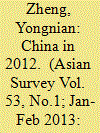

|
|
|
|
|
| Publication |
2013.
|
| Summary/Abstract |
For China, the year 2012 was politically significant with a once-a-decade power transfer taking place. However, the year was full of political scandals and rumors. From the top elite circles to the grassroots, Chinese feel increasingly anxious and frustrated. This paper examines what has gone wrong with China's elite politics, and how Chinese social groups have responded.
|
|
|
|
|
|
|
|
|
|
|
|
|
|
|
|
| 2 |
ID:
134398
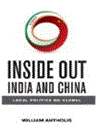

|
|
|
|
|
| Publication |
Washington, DC, Brookings Institution Press, 2015.
|
| Description |
xxii, 235p.Hbk
|
| Standard Number |
9788130929347
|
|
|
|
|
|
|
|
|
|
|
|
Copies: C:1/I:0,R:0,Q:0
Circulation
| Accession# | Call# | Current Location | Status | Policy | Location |
| 057903 | 320.954051/ANT 057903 | Main | On Shelf | General | |
|
|
|
|
| 3 |
ID:
192871
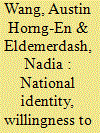

|
|
|
|
|
| Summary/Abstract |
Why do people risk their lives fighting in wars? This article looks beyond group grievance and material benefits to add another psychological mechanism explaining why people choose to fight or not to fight – perceived collective action. An individual is much more likely to fight when they perceive that others will also fight. Contrary to the expectations of social identity theory and social pressure theory, the effect of perceived collective action is stronger among those who have a weaker national identity because they are more likely to rationally calculate the chance of winning by accounting for others’ decisions. To mitigate the endogeneity in post-conflict cross-sectional surveys, we conduct a survey experiment (n = 1,001) in Taiwan manipulating perceptions of others’ willingness to fight in a potential China–Taiwan military conflict. Experimental evidence supports the hypotheses that perceived collective action works only on weak Taiwanese identifiers. The result holds in robustness checks and in another nationally representative survey.
|
|
|
|
|
|
|
|
|
|
|
|
|
|
|
|
| 4 |
ID:
106759
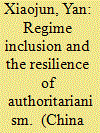

|
|
|
| 5 |
ID:
192169
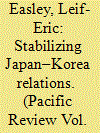

|
|
|
|
|
| Summary/Abstract |
By the time Prime Minister Abe Shinzo and President Park Geun-hye took office, Japan-South Korea relations were already experiencing a downturn over history issues and Lee Myung-bak’s unprecedented presidential visit to the disputed islets of Dokdo/Takeshima. Park’s refusal to hold a bilateral summit became the symbol of strained ties. Then on November 2, 2015 — 980 days after taking office — Park met Abe for bilateral talks in Seoul. On December 28, the two sides declared a rapprochement with an agreement supporting survivors of wartime brothels. Tensions worsened again during President Moon Jae-in’s term (2017–2022), contradicting the narrative that leaders had turned relations around in late 2015. Yet the diplomatic relationship was not on a downward spiral. Japanese and Korean policymakers managed to put a floor under their interactions owing to three stabilizing mechanisms that operated during both the Park and Moon administrations. First, political elites practiced mutual restraint to limit vicious cycles of nationalist recriminations. Second, Tokyo and Seoul carefully calibrated policies toward Beijing while avoiding divergence from each other. Third, reassuring the United States about the cost-effectiveness of its alliances involved trilateral cooperation that also helped stabilize Japan-South Korea relations.
|
|
|
|
|
|
|
|
|
|
|
|
|
|
|
|